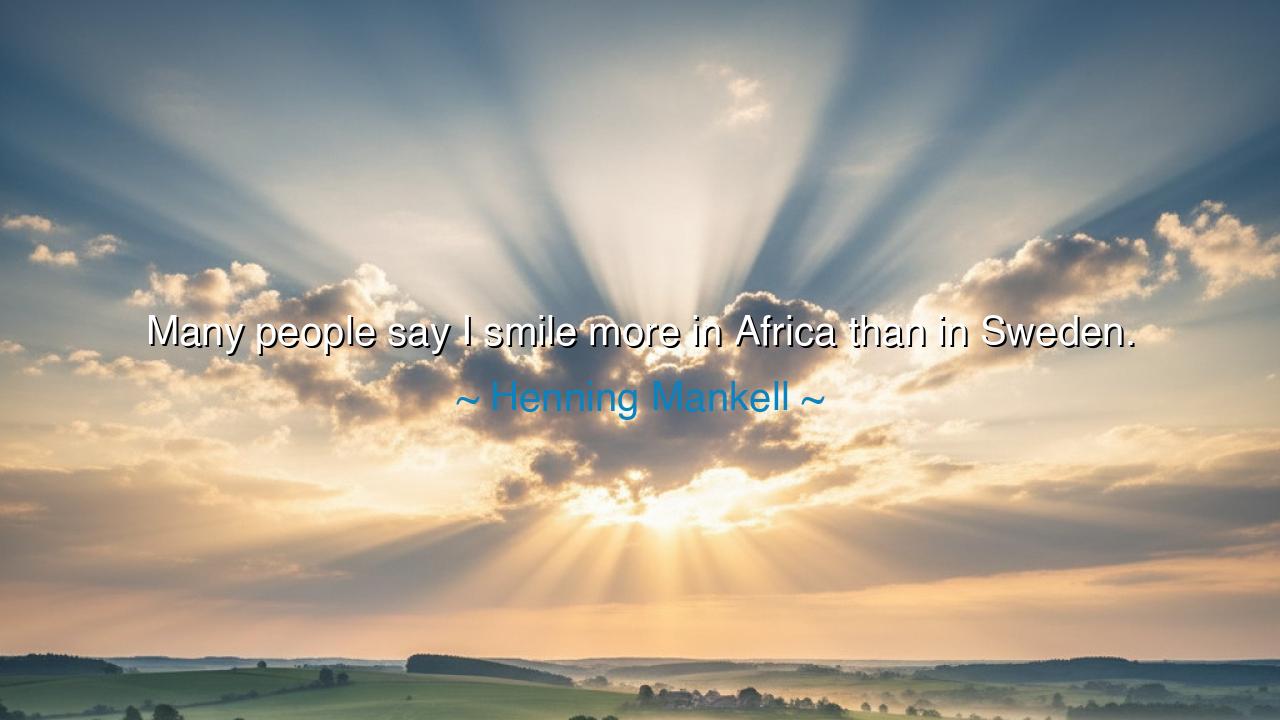
Many people say I smile more in Africa than in Sweden.






Henning Mankell, the writer whose life straddled two worlds, once confessed with striking simplicity: “Many people say I smile more in Africa than in Sweden.” At first, this may seem like a casual remark, but within it lies a profound meditation on place, spirit, and the mysterious ways in which environment shapes the soul. For what Mankell reveals is that joy is not only born within us—it is also awakened by the soil upon which we stand, the sun that warms our skin, and the rhythm of the people who surround us.
The ancients knew well that the land imprints itself upon the heart. The Greeks spoke of how the rugged mountains of Hellas forged hardy, independent men, while the fertile valleys of Egypt inspired reverence for abundance and order. Mankell’s smile in Africa reflects this same truth: that certain lands call forth hidden parts of ourselves. In Sweden, with its long winters and cool reserve, he lived in one rhythm. But in Africa, with its vibrant sun, open-hearted communities, and unrestrained humanity, another part of his spirit awakened—a part so alive that it spread across his face in smiles.
History too gives us witnesses of this phenomenon. Consider Albert Schweitzer, who left the comforts of Europe to serve as a physician in Africa. Many remarked that though his work was exhausting and the conditions harsh, he seemed more alive there than in the concert halls of Europe where he once played the organ. The struggle itself became a kind of joy, for the land and its people gave him purpose. So too with Mankell: Africa was not merely a place on a map, but a mirror in which his soul shone brighter.
The smile itself is central to his words. It is the outward sign of inward freedom. In Sweden, perhaps he felt constrained by formality, by a culture that values quiet restraint. In Africa, he found the freedom to smile more—to embrace spontaneity, to be immersed in community, to live more immediately in the present. His observation is not an insult to Sweden, but a recognition that different lands evoke different parts of our humanity, and that sometimes our truest joy is drawn out by unexpected places.
But there is also humility in his reflection. Mankell does not boast of bringing smiles to Africa; rather, he admits that Africa brings smiles to him. It is not his gift to the land, but the land’s gift to him. This reverses the arrogance of many travelers who claim to bring light wherever they go. Mankell’s wisdom is in acknowledging that it was Africa’s spirit—its people, its struggles, its warmth—that expanded his own heart. He smiled more not because he changed Africa, but because Africa changed him.
The lesson for us is profound: seek the places that awaken your smile. Do not be afraid to admit that some lands, some cultures, some communities call forth your truer self. Where your heart is lighter, where your laughter comes more easily, where your burdens feel less crushing—that is a place that nourishes your soul. And honor those places with gratitude, for they are sacred, even if far from your birthplace.
So, my children, remember Mankell’s words as a guide. Do not remain forever where your smile is hidden. Go forth into the world until you find the soil where your spirit blossoms. And when you find it—whether in Africa, in your homeland, or in the company of kindred spirits—stay long enough to let it transform you. For the greatest gift of life is not merely to survive, but to live in such a way that you smile more, not out of habit, but out of the deep joy of being fully alive.






AAdministratorAdministrator
Welcome, honored guests. Please leave a comment, we will respond soon